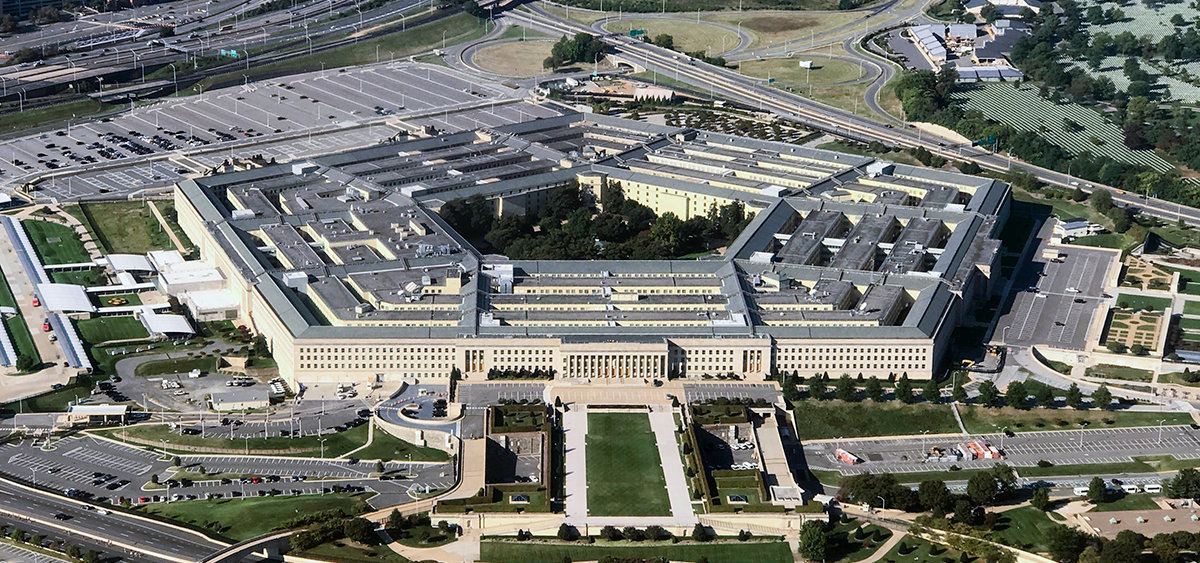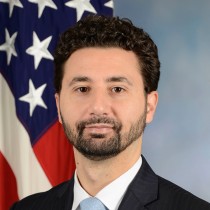

Introduction
The Department of Defense’s new overarching principle, U.S. strategic competition, will likely replace great power competition in the next National Defense Strategy, set to be released in 2022. In the latest installment of the Defense Rapid Reaction series, experts from MEI's Defense & Security Program weigh in with their thoughts on what strategic competition means for the U.S. and how it should go about implementing it in practice.
Reactions
-
Bilal Y. Saab
Bilal Y. Saab

We can’t afford to cede the Middle East to Beijing
What’s most relevant about our China-centric foreign policy priority is how we’re going to pursue it. And the fact of the matter is that we’re vastly unsure. It's not easy to reach consensus on anything in our enormous national security bureaucracy.
There are some parallels we can draw between the old Cold War and the new competition with China, but they’re not many. We know we have to compete with China, like we did with the Soviet Union, on a global stage. And we know that China, like the Soviets, wants to impose its belief system and expand its influence worldwide. But that’s the end of that comparison.
While China is significantly modernizing and expanding its armed forces (so are we, by the way), it is not even close to Soviet military power, which was a fair match for us. So this new competition is primarily about economics, influence, and international partnerships.
For us, it’s a blessing and a curse that China is integrated into the global economy in ways the Soviet Union never was. It’s a curse because this is where they derive their strength. We have no ability or willingness to isolate a country that is our largest trading partner. It’s a blessing because with integration comes vulnerability, and that vulnerability is most obvious in regions the Chinese rely on a great deal to fuel their economy and where we’ve historically had great influence. The Middle East is one of these regions.
Except that we seem to have decided to put most of our chips in the Indo-Pacific and abandon the Middle East. Why cede such strategic terrain to Beijing? And most importantly, why provoke the Chinese in their own immediate sphere of influence in East Asia and risk a military conflict?
I am in no way suggesting we should appease China in the Indo-Pacific. But we have to recognize that our alliance architecture and military presence in that part of the world are robust. There’s always room for stronger defenses for sure, but at some point we have to appreciate the law of diminishing marginal returns and possibly even the risk of blowback.
Upgrading the already powerful alliances we have in the Indo-Pacific doesn't strike me as an urgent necessity. Not losing our long-standing partners in the Middle East is. It's not really in the center where we're competing with China. Rather, it's on the periphery, which still carries great weight in global politics and security.
Bilal Y. Saab is a senior fellow and director of the Defense and Security Program at MEI.
-
Joseph L. Votel
Joseph L. Votel

We need to think and act globally
Last week I traveled to the Republic of Panama with a group of business executives from across the United States. Among other things, our mission was to get a feel for Chinese influence and business activities and help identify where opportunities may exist for our nation to be more competitive.
We found a government keen to have a strong relationship with the United States in every aspect possible. But we also found that we may be missing opportunities to be more competitive and perhaps even address some of the challenges we face here at home — like our current and future problem with near-shoring supply chains. Panama is one of many examples of countries and regions where the United States needs to be more forward-leaning on maintaining its competitive advantage.
It is necessary to maintain our strategic focus on China. There is a lot at stake, most notably our leadership and standing on the global stage. But we must not repeat the mistake of the last 30 years, over-focusing on one region or one form of competition or conflict. It is essential to prevail in the Indo-Pacific, but it is not exclusive. We need to bring all forms of national power (military, economic, business, diplomatic, and informational) to bear through a coordinated and long-term strategy that protects our national interests globally. Panama is a good example, but not the only one. We don’t need much military force there. Still, we need to make a Western-leaning government stronger and more stable through the power of our diplomacy, ideas, and our inherent economic and business prowess. An approach that positively postures the United States and its partners in multiple countries and regions with our full array of tools is the best way to ensure that we prevail in this existential competition.
Gen. (ret.) Joseph L. Votel is a distinguished senior fellow on national security at MEI. He retired as a four-star general in the U.S. Army after a nearly 40-year career, during which he held a variety of commands in positions of leadership, including most recently as commander of CENTCOM from March 2016 to March 2019.
-
Jennifer Jefferis
Jennifer Jefferis

The pursuit of our goals must not undercut their practice
Supporters of the Strategic Competition Act insist that it will not precipitate a second Cold War. Instead, it will advance healthy economic competition, human rights, and global stability. The problem is the development of a second Cold War has little to do with the intent behind the act, and far more to do with how it is implemented.
The first Cold War was characterized by a series of proxy states being caught between fidelity to a superpower and the interests of their populations. The result, particularly in the Middle East, was that often the U.S. supported governments and/or ideological platforms developed out of concert with the populaces they were supposed to represent, and the ramifications included lasting violence and instability.
When the U.S. announced a pivot to great power competition, many Middle Eastern countries feared U.S. abandonment and began to look elsewhere for external support. Seventeen have at least nominally joined China’s Belt and Road Initiative (BRI), and Lebanon — a pivotal country with enormous structural problems — is considering a massive BRI-supported infrastructure project. The U.S. is right to be worried about losing influence in the region. But strategic competition may put struggling countries like Lebanon in an impossible position, forced to choose between badly needed foreign investment and amorphously defined “progressive values.”
The U.S. is right to be actively pursuing a global strategy to advance economic competition, progressive values, and global security. The challenge is in ensuring the pursuit of our goals does not undercut their practice. It will take more than rhetorical assurances to achieve this.
Dr. Jennifer Jefferis is a teaching professor and the director of curriculum for the Security Studies Program in the Walsh School of Foreign Service at Georgetown University, as well as a non-resident scholar with MEI’s Defense and Security Program.
-
Michael K. Nagata
Michael K. Nagata

The challenge from China isn't confined to the Indo-Pacific
China is increasingly, and globally, “outflanking” the United States outside of the Asia-Pacific region.
One of the most common deficiencies in strategic thinking and policy formulation is inadequate recognition of the totality of a complex strategic challenge. It is comparatively easy, but always misleading, to hyper-focus on specific and obvious components of that challenge, and thereby lose perspective on its overall breadth and complexity. Regrettably, this is what has happened too often over the three most recent U.S. administrations when it comes to effectively contesting China’s growing power and increasingly worrisome activities.
Over several decades, China has amassed sufficient wealth, technological prowess, internal political power, and genuine extra-territorial operational experience that it today challenges U.S. interests globally. However, examining how these American administrations have chosen to compete with, and where necessary contest, China demonstrates that we have focused almost exclusively on contesting its rising power in the Indo-Pacific region, and we have been comparatively slow, risk-averse, and inattentive to how China is eroding America’s position globally and supplanting its traditional influence in other regions of the world.
Lt. Gen. (ret.) Michael K. Nagata is a distinguished senior fellow on national security at MEI. He retired from the U.S. Army in 2019 after 38 years of active duty, with 34 years in U.S. Special Operations. His final position was director of strategy for the National Counterterrorism Center from 2016 to 2019.
-
Mick Mulroy
Mick Mulroy

We need to compete by building and maintaining partnerships globally
The National Security Strategy was correct in aligning our priorities as China and Russia (strategic competition), North Korea and Iran (regional rogue state actors), and then countering terrorist organizations. However, viewing this as simply surging our military assets and efforts with allies and partners to a geographic area is not the correct implementation of that strategy. We need to compete by maintaining key partners and building new ones on a global scale. Yes, in Asia, but also in the Middle East, Africa, Europe, and the Western Hemisphere.
China and Russia view strategic competition as global, and so should we. The decision to pull all of our forces out of Afghanistan, against the advice of the entire military chain of command, was not only a mistake regarding countering terrorist organizations and maintaining the gains we had fought for over the last 20 years, but also in our efforts to militarily compete with China and Iran, both of which border Afghanistan. The military capacity we had in Afghanistan served many purposes. Likewise, if we fully withdraw from Iraq and Syria, the biggest beneficiaries will be Iran, as well as terrorist organizations.
Yes, we need to actively work to maintain our relationship with South Korea and Japan, two countries we already have defense pacts with, and the AUKUS pact between Australia, the U.K., and the U.S. was the right step, but we need to distribute our military capacity based on the current threat picture informed by the intelligence community and determined by the Joint Chiefs of Staff. Simply redirecting military assets to the Pacific may do little to counter China and may unnecessarily provoke them.
The term “strategic competition” should be changed to ”global strategic competition.” Ceding the Middle East and Africa to those we intend to compete with is, in fact, no competition at all; it is capitulation.
Mick Mulroy is a former deputy assistant secretary of defense for the Middle East, retired CIA officer, senior fellow at MEI, and ABC News national security analyst.
-
Kevin Donegan
Kevin Donegan

Do not leave the Middle East out of our China strategy
Having recently returned from the Middle East where I was fortunate to be part of a small delegation that met with the political and military leadership in Bahrain, Israel, and the UAE, you may be surprised to hear that China was a consistent topic.
The perception in the region is that the U.S. is leaving the Middle East and the remaining vacuum will be filled by others — China for one. This perception is a fallout of both our failed exit from Afghanistan and the strategic priority we have rightly placed on China. The main point made was that the vacuum resulting from a U.S. departure from the Middle East would be filled by China and others.
The U.S. can do more than one thing well. We have done more than all nations combined to provide security in the Middle East and redirecting our resources to other areas is now a necessity. As we rightly focus on China, we should not abandon our leadership position and influence in the Middle East, nor the relationships we have worked so hard to build and strengthen. Most importantly, what we do in the Middle East can and should directly contribute to our strategy related to China.
In the military and in business, it is always about the supply chain. China is strongest the closer you get to the mainland and more vulnerable as you move farther away. Together with our partners and allies we should demonstrate the capability and willingness, if required in times of conflict, to hold these supply lines at risk far from China’s shores and fully integrated with what we are doing near their shores.
It is also all about coalitions. In the Middle East, U.S. Naval Forces Central Command (NAVCENT) has a proven capability to lead global coalitions that directly support international laws, standards, and norms. Where China’s actions run directly counter to these rules, like fishing in other countries’ exclusive economic zones, causing environmental damage through its at-scale fishing techniques, or embedding hidden data and information extraction capabilities in networks and Internet of Things devices, we should be leading the charge to address these issues with regional and global coalitions.
Do not passively watch the sand being poured to make islands in the South China Sea and then complain later about them being militarized. We do not want to make the same mistake twice, so we must not passively watch China build commercial port infrastructure and capacity in places like Sri Lanka, Pakistan, Iran, and Oman and then be surprised when it is eventually militarized, as has occurred in Djibouti.
In closing, the huge investment we have made in our nation’s treasure and resources to build relationships and capability in the Middle East can and should be fully leveraged to support our global China strategy.
Vice Admiral Kevin “Kid” Donegan (ret.) is the former commander of U.S. Fifth Fleet, Naval Forces Central Command, director of operations at U.S. Central Command, and commander of our forward deployed Carrier Strike Group based in Japan. He is currently a distinguished senior fellow at MEI.











